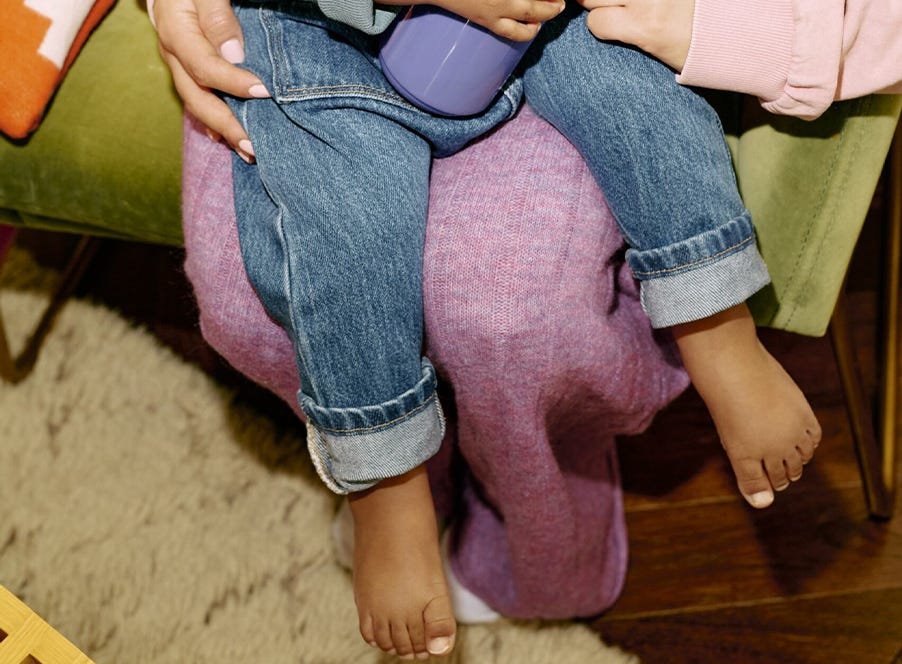
Ultimate XL Nappy Disposal Bundle with 18 Refills
Bundle & Save 40%
Subscription orders can be cancelled at anytime. Free delivery on all subsequent subscription orders. Find out more about subscriptions.
They’re easy and fuss free
Your products are automatically sent to you
You save up to 10% when you sign up for a subscription
You can cancel at any time

Seeing your baby take their first tentative steps is one of the most exciting moments of being a parent.
It’s a big step towards independence (literally) and you’ll want to be prepared!
So, let’s run through when and how most babies learn to walk, how you can encourage your little one’s first steps, and how to keep them safe once they’re able to toddle from A to B on their own.
Before we get started, please bear in mind that every child is different and the timeline of learning to walk is not set in stone.
It’s important to remember that all babies are unique and develop at their own pace. Learning to walk takes time, but if your baby isn’t walking by 18 months, don’t hesitate to reach out to your family doctor or health visitor for support and guidance.
Learning to walk is a key gross motor milestone on a baby’s developmental timeline alongside other big movements like sitting, jumping and climbing, and little ones start to prepare for walking as early as three months of age.
Anywhere between nine months and 15 months, most babies will have the muscle strength, balance, and coordination to make their first independent steps.
Most babies start to walk after their first birthday. Anything before then is usually considered early.
You’ll know that your mini-me is close to being able to walk solo if they are…
Although you can’t speed up your baby’s development, you can use the following tips to support your little one on their journey towards solo walking.
Holding your little one’s hands as they get used to putting one foot in front of the other helps support them. It can also be a lovely way to bond.
If your little one can stand up but seems hesitant to step then sit or stand a few steps away from them and try to coax them to walk towards you. You can try holding one of their favourite toys and remember to give them a big smile! Learning to walk should be lots of fun.
If they do fall, you can boost your baby's confidence and motivate them to try again by picking them up, cuddling them, and helping them stand and go again.
Special baby trollies or carts are designed for your little one to push along as they walk forward and can help build their confidence. Just make sure that they're always supervised when using a push-along toy.
Your baby will be able to balance on safe indoor surfaces just fine without a pair of shoes. They can wear non-slip cotton socks but going barefoot as much as possible is a good way to help their arches develop and build muscle tone.
Low-top soft shoes are best for babies who are new to walking. Too much ankle support can limit their movement when they’re just getting started. Remember to check their tiny toes have enough room to move.
It’s normal for babies to experience a few stops and starts during their development. They may seem to have aced walking, then regress slightly as they start to learn another new skill, like eating finger foods. This is totally normal, so don’t stress and enjoy the ride!
While learning to walk is an exciting time for you and your baby, accidents can happen. These tips can help you to baby-proof your home when your baby starts to become more mobile.
To make sure that their feet develop healthily, experts advise that parents don’t buy their baby’s first pair of shoes until they’re walking confidently.
Once they can walk solo, a toddler only really needs to wear their shoes when walking outside. It’s best to choose shoes that have grip, aren’t restrictive on the ankle and are above all comfortable. Flexible soles are recommended when baby is in the cruising stage of learning to walk.
Make sure their feet are measured by a professional and you should check the fit of their shoes regularly.